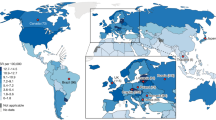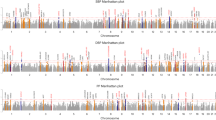Abstract
FAMILIAL renal adenomas in the rat have been described in a previous report1. They usually occurred as multiple tumours and were bilateral. The tumours were simple cysts, papillary cystadenomas, solid eosinophile adenomas or solid basophile tubular adenomas. They varied in size from barely visible to large growths which included almost the entire kidney (Fig. 1). The material consisted of a number of individuals from a line of Wistar rats maintained in this laboratory, indicating that the condition was genetically controlled.
This is a preview of subscription content, access via your institution
Access options
Subscribe to this journal
Receive 51 print issues and online access
$199.00 per year
only $3.90 per issue
Buy this article
- Purchase on Springer Link
- Instant access to full article PDF
Prices may be subject to local taxes which are calculated during checkout
Similar content being viewed by others
References
Eker, R., Acta Path. et Microbiol. Scand., 34, 554 (1954).
Author information
Authors and Affiliations
Rights and permissions
About this article
Cite this article
EKER, R., MOSSIGE, J. A Dominant Gene for Renal Adenomas in the Rat. Nature 189, 858–859 (1961). https://doi.org/10.1038/189858b0
Issue Date:
DOI: https://doi.org/10.1038/189858b0
This article is cited by
-
Transgenic expression of the N525S-tuberin variant in Tsc2 mutant (Eker) rats causes dominant embryonic lethality
Scientific Reports (2014)
-
Epilepsy and Tsc2 Haploinsufficiency Lead to Autistic-Like Social Deficit Behaviors in Rats
Behavior Genetics (2011)
-
The G1556S-type tuberin variant suppresses tumor formation in tuberous sclerosis 2 mutant (Eker) rats despite its deficiency in mTOR inhibition
Oncogene (2008)
-
Diagnostic tumor marker of asbestos-related mesothelioma
Environmental Health and Preventive Medicine (2008)
-
Transgenic rescue from embryonic lethality and renal carcinogenesis in the Nihon rat model by introduction of a wild-type Bhd gene
Oncogene (2006)
Comments
By submitting a comment you agree to abide by our Terms and Community Guidelines. If you find something abusive or that does not comply with our terms or guidelines please flag it as inappropriate.



